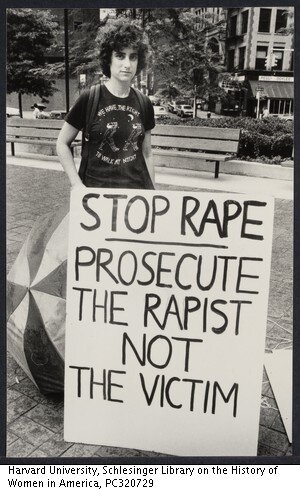S2: E6. Against Our Will
In the 1960s and early 1970s many Americans believed that rape was a rare and violent act perpetrated by outsiders and sociopaths. Popular culture taught men that women needed to be tricked or coerced into sex, and psychiatrists accused rape victims of secretly inviting their attacks. Susan Brownmiller’s best-selling book Against Our Will shattered these myths about sexual violence. Informed by the broader feminist anti-rape movement, Against Our Will portrayed rape as a systemic, pervasive, and culturally sanctioned act of power and intimidation. Yet even as Brownmiller provided a framework for naming sexual violence as a mechanism of patriarchy, she also minimized the importance of race and denied the ways that rape accusations have long justified the criminalization and murder of men of color. At a moment when #MeToo has brought about yet another national reckoning with sexual violence and male power, Brownmiller’s book, its legacy, and the contexts that produced the anti-rape movement of the 1970s demand re-examination.
Hosts and Creators: Gillian Frank and Lauren Gutterman
Senior Producer: Saniya Lee Ghanoui
Producer and Story Editor: Rebecca Davis
Assistant Producers: Chris Babits, Isabel Machado and Mallory Szymanski
Intern: Julian Harbaugh
Thank you to Susan Brownmiller for sharing her story with us.
Music: “You Don’t Own Me” by Lesley Gore. “Fight Back!” by Holly Near.
Music: “Darkened Treeline,” “Our Names Engraved,” “Crumbling Dock,” “Dash and Slope,” “The Telling,” “Boston Landing,” “Algea Trio,” “Derailed,” and “Waterbourne,” by Blue Dot Sessions.
Selected Bibliography:
Maria Bevacqua, Rape on the Public Agenda: Feminism and the Politics of Sexual Assault, (Boston: Northeastern University Press, 2000)
Susan Brownmiller, Against Our Will: Men, Women, and Rape, (New York: Ballantine Books, 1993)
Barbara A. Crow, ed., Radical Feminism: A Documentary Reader (New York: NYU Press, 2000)
Angela Y. Davis, Women, Race, & Class, 1st Vintage Books ed edition (New York: Vintage, 1983)
Catherine O. Jacquet, The Injustices of Rape: How Activists Responded to Sexual Violence, 1950–1980 (Chapel Hill: The University of North Carolina Press, 2019)
Danielle L. McGuire, At the Dark End of the Street: Black Women, Rape, and Resistance (New York, NY: Vintage, 2011).
If you enjoyed this episode, please review us on iTunes or Soundcloud and share us on social media.
Please support our work and keep new episodes coming by making a small donation to Sexing History.
We invite you to click this link to read a rough transcript of this episode.
Further Readings







